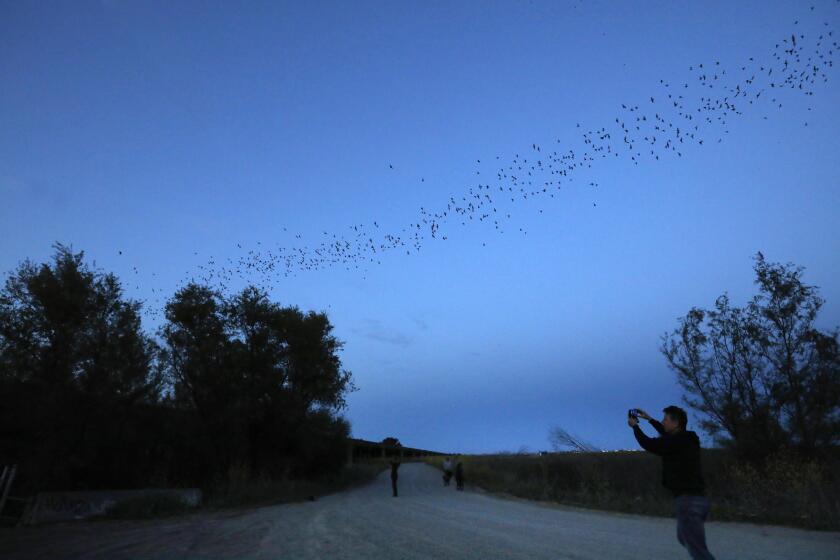Shortage of deputies could threaten L.A. County sheriff’s reform agenda

L.A. County Sheriff’s Deputy Guillermo Martinez gets in the face of a recruit on his first day at the Biscailuz Regional Training Center in Monterey Park. For every 100 applicants, only two or three end up wearing the badge.
As Los Angeles County Sheriff Jim McDonnell tries to turn around a department under federal scrutiny for jail brutality, racial harassment and corruption, one of his most immediate challenges is a staffing shortage that could threaten his reform agenda.
By July, the number of sworn employees needed to fill the gap will be about 1,300, according to sheriff’s officials, including hundreds of deputies to make the county jails safer in response to an inmate abuse scandal and a rash of jail suicides. The deputies’ union puts the number even higher.
------------
FOR THE RECORD
June 2, 2:17 p.m.: An earlier version of a caption on a photograph accompanying this article misidentified L.A. County sheriff’s Deputy Guillermo Martinez as Guillermo Garcia.
------------
McDonnell is expanding an understaffed recruiting department and launching a hiring push. But he must avoid the mistakes of previous large-scale recruitment drives under his predecessor, Lee Baca, when the department added new deputies with histories of misconduct.
The problem is not money: Most of the positions are funded. Rather, it is not easy to find qualified candidates. For every 100 applicants, only two or three end up wearing the badge. McDonnell has vowed not to lower standards to get more bodies in the door.
To make up for the shortage, deputies are sometimes working back-to-back eight-hour shifts, leaving them exhausted and raising safety concerns.
“We would rather work short than hire the wrong people,” said Todd Rogers, the assistant sheriff in charge of personnel and recruiting. “We are not going to compromise our standards just to meet a hiring goal.”
Los Angeles County has the largest sheriff’s department in the nation, with about 9,000 sworn deputies and a total of about 18,000 employees.
Next year’s county budget, which takes effect in July, will probably contain money for an additional 521 positions in the jails, about half of them sworn personnel and half unsworn custody assistants. The increased staffing, along with overtime to cover jobs that remain unfilled, is expected to cost $76 million in the first year and $92 million the next.
The new jail personnel will perform tasks such as checking on inmates and dealing with inmate complaints, as required by a settlement in a lawsuit brought by inmates who alleged that jail deputies beat them. More staff will be added to supervise and train deputies and to review cases in which deputies use force against inmates.
Some positions are also being created in anticipation of an expected settlement with the federal government, which has alleged that jail officials failed to prevent inmate suicides. Additional deputies to monitor mentally ill inmates will reduce the chances of self-harm.
In addition to the new jail jobs, the 1,300 vacant sworn positions include deputy vacancies from retirements and departures as well as about 400 deputy jobs that the department does not have the money to fill. Also part of the total are 180 sergeant and lieutenant positions left open because those who would be promoted are needed on the front line as deputies.
Union officials say the number of unfilled jobs is even higher — more than 1,700, based on a different calculation of how many positions have been authorized by the county.
The shortage is not seriously affecting the services provided to the public, since deputies are filling the gaps by working overtime, sheriff’s officials said. But it will be difficult for McDonnell to make substantial improvements if he does not have enough boots on the ground.
“It’s constant prioritization and triaging,” McDonnell said.
Before becoming sheriff, McDonnell served on a blue-ribbon commission that recommended major reforms to reduce deputy abuse of inmates. When he took office Dec. 1, he inherited a department reeling from criminal charges against 21 sheriff’s officials.
Former Undersheriff Paul Tanaka was indicted earlier this month for allegedly obstructing a federal investigation into assaults by deputies against jail inmates. Seven former sheriff’s officials have already been convicted in a related case.
In April, the Sheriff’s Department signed an agreement with the federal government to ensure that deputies in the Antelope Valley no longer single out blacks and Latinos for harsh treatment.
Jeffrey Steck, president of the Assn. for Los Angeles Deputy Sheriffs, warned of dire consequences if there are not enough deputies to check on jail inmates or respond to 911 calls. After showing up to work, deputies are sometimes being asked to take on an additional eight-hour shift for a total of 16 hours.
“It puts the deputies in danger, and I think it puts our population in danger, our citizens in danger,” Steck said. “There is going to be some tragedy where we’re going to look back at that guy who was on duty for 15 or 16 hours and say that was a mistake, say, ‘I told you.’”
The deputies’ union, which is in contract negotiations with the county, argues that better pay is crucial when the Sheriff’s Department is competing with other agencies for the same qualified candidates. Deputy salaries, which start at $59,873 a year, need to be higher to be more competitive with other agencies, union officials said.
According to a survey by the union, L.A. County ranks near the bottom third in California for pay after 15 years on the job, with Anaheim, Irvine, the LAPD and Orange County among the law enforcement agencies with higher salaries. Rogers, however, cited figures from the L.A. County Chief Executive Office that put deputy compensation at the highest in Southern California and 9% ahead of the LAPD when benefits are included with salaries.
In the past, sheriff’s officials have sometimes loosened hiring standards — with dangerous consequences.
In 2006, some applicants were hired despite criminal records and histories of drug and alcohol abuse. In 2010, the department absorbed hundreds of officers from a small police force that patrolled county facilities and parks, including some who had committed serious offenses, such as falsifying records, soliciting prostitutes and stealing. For years, the department also operated a “Friends of the Sheriff” program that allowed candidates with connections to high-ranking officials to enter through a separate hiring track.
Because of budget problems, hiring was frozen for several years beginning around 2010, and the department has struggled to catch up.
One long-standing recruiting barrier has been a requirement that all new deputies spend their first few years working in the jails, even if they are mainly interested in a patrol career. A “dual track” system, with separate career paths for custody and street patrol, has been implemented, but for now, new deputies still start in the jails because of staffing needs.
The shortage facing the L.A. County Sheriff’s Department stands in contrast to the relatively full rosters at other large law enforcement agencies.
At the LAPD, the number of vacancies is relatively small — about 100 for a department of nearly 10,000 officers, said Capt. Anita Ortega. The Orange County Sheriff’s Department also is close to full staffing, said Lt. Matthew Stiverson.
In Los Angeles County, the Sheriff’s Department is starting a new recruitment drive and has already increased the number of applicants to about 360 a week from 250. The number of academy classes is also increasing from six a year to eight.
At a Dodgers game Thursday night, McDonnell and LAPD Chief Charlie Beck threw the ceremonial first pitch after announcing a recruiting partnership with the team. Sheriff’s deputies and LAPD officers — among them a SWAT team member, an explosives detector and a helicopter pilot — are featured on baseball cards along with Dodgers players. Sheriff’s officials will be holding Twitter chats and reaching out through Facebook and the Dodgers Radio Network.
But even if more applicants are coming through the door, the odds of shaking the sheriff’s hand at graduation remain slim.
A quarter fail an initial screening, another quarter fail the written test and 1 in 3 fail the physical fitness test. Failure rates for the background check and medical exam exceed 50% for each.
Then comes the six-month training academy. Twenty percent of those who start on the first day end up washing out.
The L.A. County Sheriff’s Department is not unique in this respect. In Orange County, 3% to 5% of applicants end up joining the 2,000-person department.
On a recent morning in Norwalk, Nicolette Barfield hoped to beat the odds and become an L.A. County deputy sheriff. She had made it through push-ups, sit-ups, an agility sprint and an arm strength test. Up next: a 1.5-mile run.
After less than one lap around the track, her jog slowed to a walk. Later, she stood with two others who had failed the physical fitness test, listening to Teresa Knauls of the Sheriff’s Department give training suggestions.
Run on the street, not a treadmill — and include hills in your workout.
“Criminals don’t run on treadmills when they escape,” Knauls said.
Barfield, 23, who works as an inspector for vacation rentals, said she would train harder and try again. For her, becoming a sheriff’s deputy would be a chance not just to arrest and jail suspects but to give them guidance on how to improve themselves.
“I want to be that mentor as well as the person who helps them understand why they made a mistake,” she said.
More to Read
Sign up for Essential California
The most important California stories and recommendations in your inbox every morning.
You may occasionally receive promotional content from the Los Angeles Times.











![[20060326 (LA/A20) -- STATING THE CASE: Marchers organized by unions, religious organizations and immigrants rights groups carry signs and chant in downtown L.A. "People are really upset that all the work they do, everything that they give to this nation, is ignored," said Angelica Salas of the Coalition of Humane Immigrant Rights. -- PHOTOGRAPHER: Photographs by Gina Ferazzi The Los Angeles Times] *** [Ferazzi, Gina -- - 109170.ME.0325.rights.12.GMF- Gina Ferazzi/Los Angeles Times - Thousands of protesters march to city hall in downtown Los Angeles Saturday, March 25, 2006. They are protesting against House-passed HR 4437, an anti-immigration bill that opponents say will criminalize millions of immigrant families and anyone who comes into contact with them.]](https://ca-times.brightspotcdn.com/dims4/default/34f403d/2147483647/strip/true/crop/1983x1322+109+0/resize/840x560!/quality/75/?url=https%3A%2F%2Fcalifornia-times-brightspot.s3.amazonaws.com%2Fzbk%2Fdamlat_images%2FLA%2FLA_PHOTO_ARCHIVE%2FSDOCS%2854%29%2Fkx3lslnc.JPG)